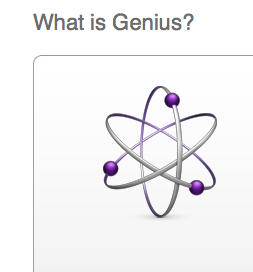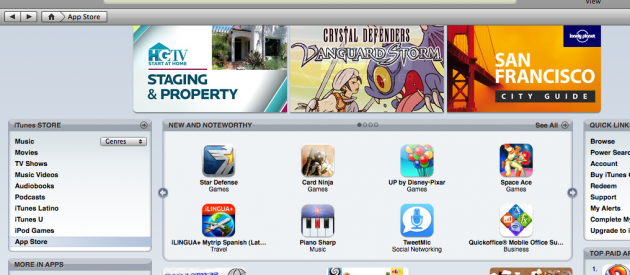 You may not realize it yet, but the App Store is broken.
You may not realize it yet, but the App Store is broken.
I spent this week at Apple’s WWDC conference in San Francisco talking to quite a few iPhone app developers. One thing that struck me was just how many of them shared the exact same concern with the App Store: App discovery.
By now, you’ve likely heard some of the success stories from the App Store (Apple does what it can to promote these at just about every event it holds pertaining to the iPhone now). But for each of those, there are also a ton of developers who work hard on apps only to watch them fall by the wayside. Apple’s greatest strength with the store — the fact that there are now 50,000 + apps — is also turning into its weakness with many developers. And if it doesn’t adapt the store to its huge growth, those developers might start looking at other platforms.
The problem is that while early on, it was pretty easy for small-time developers to make an app and get it noticed in the store, now with 50,000 apps, we’re getting to the point where you need to do something else to promote your apps. That’s good news for big time development studios like EA, which can throw marketing money at the problem. But for some smaller developers — some of which are just one person — that’s simply not an option. But there is one potential solution, and it’s one Apple already has built-in to iTunes: Genius recommendations.
Apple rolled out its “Genius” feature for recommending music on iTunes last year. Based on my experience with it, I believe it really is genius — it scans your music library and uploads the information to iTunes’ servers where it compares it to other users’ libraries (anonymously) and sends back recommended playlists based on the other songs you have on your computer. And, perhaps more importantly, it also recommends songs on iTunes that you will probably like based on songs in your library. Apple also more recently rolled out the same feature for movies purchase recommendations on iTunes. And it’s the iTunes Store recommendations that are key, because it could easily do the same thing with the App Store.
 At its most simple level, it could probably work like this: Say there’s an app that you downloaded and really like, Apple should be able to recommend other apps of a similar genre you might like based on what others’ downloading habits are. But Apple could probably go much deeper than that and see which apps you use (or at least launch) the most, and use that as a basis for these recommendations as well. And it could also use the star rating system it already has in place as another point of recommendation — though it should probably make it easier to rate apps from within iTunes if it does that.
At its most simple level, it could probably work like this: Say there’s an app that you downloaded and really like, Apple should be able to recommend other apps of a similar genre you might like based on what others’ downloading habits are. But Apple could probably go much deeper than that and see which apps you use (or at least launch) the most, and use that as a basis for these recommendations as well. And it could also use the star rating system it already has in place as another point of recommendation — though it should probably make it easier to rate apps from within iTunes if it does that.
While such a system may not be perfect, it would be much better than the current system of app discovery through iTunes, which really isn’t too fair to little developers. Apple features some apps within iTunes, but those are usually skewed towards ones made by the bigger App Store players. For example, look at the apps featured along the top of the App Store right now: The Sims 3 (an EA game), ESPN Scorecenter, A Home & Garden app, a Lonely Planet app and a Square Enix game.
Now, to be fair, those are all popular things in their own regards, so the largest collection of people would probably be interested in them and so it makes sense for Apple to highlight them. But in doing so, it’s perpetuating a type of “rich get richer” system that threatens to take over the App Store.
And if you are a smaller app, it’s not like being featured on this main iTunes App Store page matters all that much anyway. I spoke with one developer of a top application this week who told me that when his app was featured on this main page, they only say a single-digit percentage point bump in terms of downloads. Much bigger, he says, was when it was featured on the iPhone version of the App Store.
 But let’s look at the featured ones there. It’s largely more of the same: ESPN Scorecenter, a THQ game for the new Disney movie Up, the Sims 3 again, an AT&T app, etc. Apple does do a much better job diversifying this list, wrapping in some smaller apps as well, but there are still only so many apps they can fit in this area — especially since it’s on a much smaller screen. Again, a Genius feature on the iPhone or iPod touch would go a long way in helping to uncover new, under-the-radar apps.
But let’s look at the featured ones there. It’s largely more of the same: ESPN Scorecenter, a THQ game for the new Disney movie Up, the Sims 3 again, an AT&T app, etc. Apple does do a much better job diversifying this list, wrapping in some smaller apps as well, but there are still only so many apps they can fit in this area — especially since it’s on a much smaller screen. Again, a Genius feature on the iPhone or iPod touch would go a long way in helping to uncover new, under-the-radar apps.
The Top Paid and Free app lists are great when it comes to helping with downloads, I hear as well. Of course, you have to actually move a lot of apps to get on those lists to begin with. So it’s another of the “rich get richer” situations.
Some smaller developers have started to think outside the box to promote their apps. A bunch of them have started banding together, forming their own networks of sorts, for promotion. This method allows them to not only promote each other’s apps over the web, but within the apps themselves. That way if one of them takes off, the likelihood that another one of the apps in this group will be seen, is much greater.
Another outlet that app makers use to try and get traction is the press. Every day, we’re pitched dozens of apps, even though we don’t really cover that many apps here at TechCrunch. If we happen to, that seems to be a decent way for an app to get some downloads, but that fame is often fleeting. A developer’s best chance in this regard is to hope that their app gets enough coverage from multiple outlets over an extended period of time. That should help it both spread by word of mouth and hopefully make it onto one of the top apps lists. But again, this is very hard to do.
And these alliances and means of promotion pale in comparison to having Apple actively promoting your app. It shouldn’t surprise anyone that if you can get our app on one of the iPhone’s television commercials, your downloads will absolutely go through the roof. And if Apple puts your app on the demo units in its store, that helps sales in a big way as well. But Apple can only do that for so many apps. There needs to be a better way, that scales to a huge store — which the App Store has become.
All this matters because there is plenty of money behind all of this. The App Store is already a big business for many developers, and increasingly for Apple itself. And when Apple launches the in-app payment system in the iPhone 3.0 software due next week, I think the store could even jump to the next level in terms of people making money off of it.
But to keep the overall momentum the store has going, Apple needs to make sure its ecosystem is enticing for the small developers to work in. And that’s getting to be a problem with so many apps now in the store, and with so many big name development houses now making apps. I think a Genius app recommendation feature would go a long way to help this.
